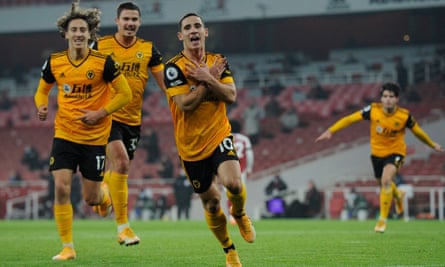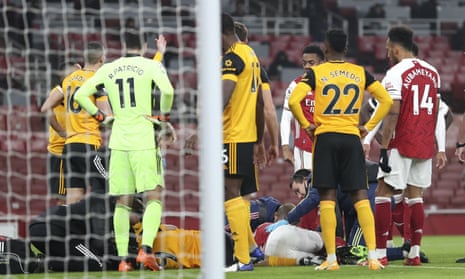The most important news to emerge from an unsettling evening was that Raúl Jiménez, who had been carried off on a stretcher with a head injury that left everyone inside the stadium fraught with worry, was conscious and responding to treatment by the time he reached hospital.
Nobody will want to see replays of the collision with David Luiz that held up this game for 10 minutes, and much less will those present want to relive the sound. The shockwave of anxiety that followed was palpable and, while clearer information about Jiménez’s prognosis will emerge in time, the relief when updates about his condition began to circulate was equally pronounced.
Wolves may now feel better placed to take pleasure from a confident win that further darkens the cloud around an errant Arsenal but questions about the incident that clouded everything, primarily surrounding why on earth David Luiz continued playing until the interval, will reverberate.
“I hope and pray that everything is OK because it’s the one thing that matters today,” said the Wolves captain Conor Coady. “It was a tough thing that happened but [Jiménez] is with the right people and that’s the most important thing.”
The match had begun at a roaring pace when, after Willian aimed a fifth-minute corner towards the near post, Jiménez and Davis Luiz hurled themselves at the ball. They made contact as Jiménez headed clear and it was immediately evident the consequences would be grave. Two medics from each team raced on to the pitch, with both players lying motionless, and it gradually emerged Jiménez had taken the more serious blow.
A bloodied David Luiz rose, looking groggy, and took treatment while Jiménez was steadied for the stretcher. The striker received oxygen and was eventually carried around the perimeter, following a significant delay, to the concern of players from both teams.
It seemed unbelievable, given what had passed, that a by-now bandaged David Luiz could continue. He took his place in Arsenal’s defence as the game restarted, though, and the club said afterwards that all necessary protocols were followed. To be clear, that is not in question. Whether the Premier League’s existing concussion measures are sufficient is the real point at hand and, given the wider conversation about head injuries in football, it was jarring to see David Luiz play on with blood seeping through his dressing.
He carried on until half-time and was then withdrawn. “David wanted to continue but we took him out because he wasn’t comfortable heading the ball,” Mikel Arteta said, explaining the centre-back had a “nasty cut”. Regardless, the introduction of concussion substitutes surely cannot come quickly enough.
“The first question when we went in at half-time was: ‘How’s Raúl?’” Coady said. Both sides deserve credit for gathering themselves to produce a watchable spectacle in the meantime. Most of the players were in Wolves’ penalty area when the accident happened and it was no small achievement to proceed as normal.
The goals were all scored before the interval and Wolves merited their lead, even if Arteta was less than inclined to agree afterwards. Nuno Espírito Santo again chose a more fluid 4-2-3-1 formation and their raids oozed menace and precision, bringing a well-worked opener before the half-hour.

It came when Adama Traoré, starting in the league for the first time since September, scorched a trail past Kieran Tierney and chipped across from the byline. Leander Dendoncker should have capitalised but headed against the bar; Pedro Neto reacted smartly to render that immaterial.
Arsenal found a quick equaliser, imperiously headed in by Gabriel Magalhães after Willian had worked a short corner with Héctor Bellerín. But Wolves still carried the threat, Bernd Leno saving from Dendoncker before they struck again. More fine work from Traoré led Neto to uncork a deflected shot that squirmed away from Leno; again a Wolves player was sharp to the rebound, Daniel Podence taking a slick touch past Gabriel and finishing coolly.
More could have followed, Traoré wasting one chance and several positions being squandered late on. Wolves’ attacks looked more incisive than those of an Arsenal side whose problems are stark. They have lost three home games in a row and, while there were opportunities for Bukayo Saka and Reiss Nelson to equalise in the second half, there is no escaping the fact they look clunky and short of ideas.
Exactly a year after Unai Emery’s sacking, this was a reminder Arteta has plenty more to do before his team have credible designs on the top four. Firing up Pierre-Emerick Aubameyang is one such task and Arteta admitted he was concerned after his captain endured yet another frustrating night. “We all are, because the main goalscorer of the club at the moment isn’t scoring goals,” the manager said. “He needs to be scoring goals if we want to be successful.”
Their opponents’ centre-forward occupied most thoughts, though. By the end little felt particularly important bar the tidings about Jiménez’s health.

Comments (…)
Sign in or create your Guardian account to join the discussion